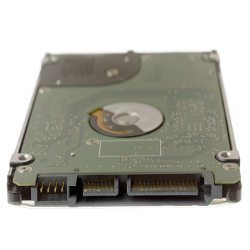Hard Disk Replacement
Most PCs and laptops are fitted with hard disk drives on which local files are stored (e.g. word documents, pictures, music, videos etc.). Conventional hard disk drives contain one or more spinning discs over which an arm moves to read and write data. When the drive is powered down, the arm is 'parked' so as to minimise the possibility of damaging the discs by contact. If the hard drive is knocked while not in a 'parked' state, the discs can easily be damaged leading to loss of data or drive failure. However, drives can fail for many other reasons. In some instances, an inherent fault with a drive can lead to failure within as little as the first few months of use. Other times, drives will last for many years before finally failing. Although there are methods of detecting how healthy a hard drive is, for example using SMART monitoring, the best policy is to ensure that all important files are backed up using an external hard drive, USB pen drive or even using cloud based services (for example Dropbox or Google Drive).

Drive Failure
If a hard disk drive fails, your computer, or rather its operating system (e.g. Windows) will fail to load. Hard disk drives are relatively easy to replace, however unless an operating system is loaded onto the drive, the computer will be completely useless. In the majority of cases, we can install the original operating system when replacing the hard drive, provided you have a valid licence 'key' for the operating system. This is usually printed on a sticker attached to the computer. We will be able to advise you as to whether this is the case prior to repair.
If you do not have a valid licence key (which is rare) we will not be able to install the operating system unless you purchase a genuine copy of the operating system or agree to installing an alternative operating system such as Linux.
Solid State Drives
Solid state drives (SSDs) are an alternative to traditional 'spinning disc' hard drives. Solid state drives use flash memory to store files and have no moving parts. This means they are far less likely to be damaged by impact forces. In addition, SSDs are noticeably faster than traditional hard drives. It is possible to replace conventional hard disk drives with SSDs.
